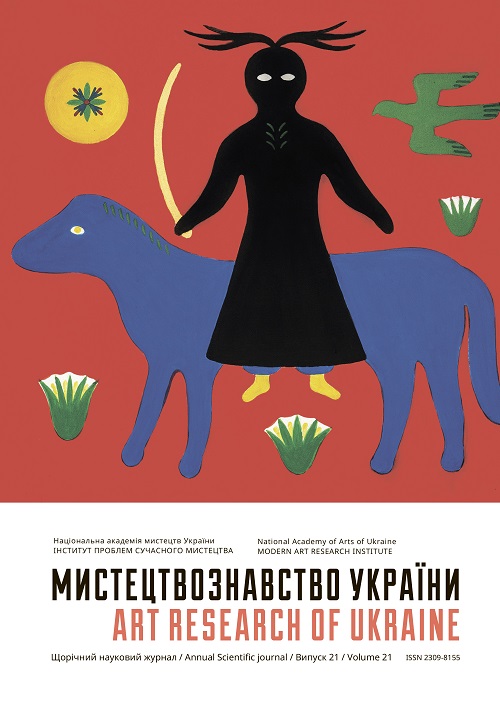Global Public Art як фатична інтеракція мультикультуралізму
DOI:
https://doi.org/10.31500/2309-8155.21.2021.254675Ключові слова:
масова культура, масовізація, глобальне публічне мистецтво, фатична комунікація, дизайнізація, мультикультуралізмАнотація
Від зламу міленіумів масовізацію візуальних практик, зокрема global public art, що утворився під впливом мультикультурних процесів, трактують в академічних колах і ЗМІ успіхом затвердження нової contemporary парадигми, що остаточно відмовила традиційному досвіду естетичного судження, концентруючись на phatic-функції транснаціональних інтеракцій, підлеглих ринковій ідеології капіталу. Між тим формальне спрощення арт-вислову не є новою подією, попри те що відбувається цей процес масової дизайнізації в умовах глобальної діджиталізації і поширення маркетингових стратегій public relations в мультикультурному контексті. Подібні інверсії духовного культуротворення в суцільну матеріалістичну оптику творчого світобачення, рахуючи дескрипцію «глобально-локальних» мистецьких актів схвальними статтями заангажованих мистецтвознавців, траплялися і раніше, що знайшло віддзеркалення у важливій критичній праці Г. Фостера «Design and Crime». Втім, подібні критичні оцінки культуріндустрія замовчує, хоч теперішня криза теорії і практики увійшла в стан пролонгованого гістерезису, продукуючи масовізований фатичний продукт, тим посилюючи ентропію соціокультурних взаємин націй, і разом з тим викриваючи нежиттє здатність global public art.
Посилання
Malinowski, B. (1999) On Phatic Communion / B. Malinowski // The Discourse Reader. (Еd.) A. Jaworski, N. Coupland. New York: Routledge. P. 302–305.
Pocheptsov, G. (2001) Teoriya kommunikatsii. Moskva, Kiev: Refl-buk-Vakler. 656 s. [Theory of communication. Moscow, Kyiv: Refl-book-Wakler].
Shevchenko, I. S. (2015) Sootnoshenie informativnoy i faticheskoy funktsiy kak pro-blema ekolingvistiki // Kognitsiya, kommunikatsiya, diskurs. #10. S. 114–132. [The ratio of informative and phatic functions as a problem of ecolinguistics // Cognition, communication, discourse].
Denysko, P. V. (2017) "Chysti" vidnosyny ta novi komunikatsiini tekhnolohii // Filosofiia ta politolohiia v konteksti suchasnoi kultury. Vyp. 1 (16). S. 130–143. ["Clean" relations and new communication technologies // Philosophy and political science in the context of modern culture].
Shveytser, A. (2009) «Ya rodilsya v period duhovnogo upadka chelovechestva». / Krizis so-znaniya: sbornik rabot po filosofii krizisa. Moskva: Algoritm. S. 5–11. ["I was born during the period of spiritual decline of humanity." / The crisis of consciousness: a collection of works on the philosophy of crisis. Moscow: Algorithm].
Virilio, P. (2009) Nizverzhenie v pustotu. / Krizis soznaniya: sbornik rabot po filo-sofii krizisa. Moskva: Algoritm. S. 205–248. [Throwing down into emptiness. / The crisis of consciousness: a collection of works on the philosophy of crisis. Moscow: Algorithm].
Mueller, Antony P. No Privacy, No Property: The World in 2030 According to the WEF // MISES WIRE. 12.08.2020. — URL https://mises.org/wire/no-privacy-no-property-world-2030-according-wef
Bishop, Claire. (2012) Artificial hells: participatory art and the politics of spectatorship. London, New York: Verso.
Mulenga, A. M. (2016) Contemporary Zambian Art, Conceptualism and the ‘Global’ Art World. URL https://www.academia.edu/33669997/
Foster, H. (2002) Design and Crime (And Other Diatribes). London, New York: Verso.
Wroblewski, Filip. (2013) The art without Art. Zeszyty Naukowe Uniwersytetu Jagiellońskiego MCCCXXX. Prace Etnograficzne. Тom 41 (2). 113–119.
Lettau, Paris. (2016) Artist, Non-Artist, Total Artist. URL https://www.academia.edu/32132843/
Haag, E. (2009) I net meryi schastyu i otchayaniyu nashemu / Krizis soznaniya: sbornik ra-bot po filosofii krizisa. Moskva: Algoritm. S. 249–256. [And there is no measure of our happiness and despair / The crisis of consciousness: a collection of works on the philosophy of crisis. Moscow: Algorithm].
Bernays, Edward L. (1928) Propaganda. New York: Horace Liveright. URL http://www.historyisaweapon.com/defcon1/bernprop.html
Crawford, Ryan. (2018) Index of the Contemporary: Adorno, Art, Natural History // Evental Aesthetics. Aesthetic Intersections 2. Vol. 7 (2). 32–70.
Mussett, Shannon. (2012) Irony and the Work of Art: Hegelian Legacies in Robert Smithson // Evental Aesthetics. Vol. 1 (1) Aesthetics After Hegel. 48–76.
Jansen, Y. (2013) Secularism, Assimilation and the Crisis of Multiculturalism: French Modernist Legacies. Amsterdam University Press.
Gilroy, P. (2004) Postcolonial Melancholia. New York: Columbia University Press.
Phillips, A. (2007) Multiculturalism without Culture. Princeton: Princeton University Press.
Gilroy, P. (2006) Multiculturalism and post-colonial theory // The Oxford Handbook of Political Theory. Oxford: Oxford University Press. Р. 656–677.
Sen, A. (2006) Identity and Violence: The Illusion of Destiny. New York: Norton &Company.
Gunew S. Postcolonialism and Multiculturalism: Between Race and Ethnicity. URL https://faculty.arts.ubc.ca/sgunew/RACE.HTM
Chilvers, I., Glaves-Smith, J. (2009) Contemporary Art Society / Oxford Dictionary of Modern and Contemporary Art. Oxford University Press. URL https://oxfordindex.oup.com/view/10.1093/oi/authority.20110803095634675
Fry, R. (1920) Vision and Design / Roger Fry. London: Chatto & Windus. URL https://archive.org/details/visiondesign00fryr/mode/2up
Bosenko A. V. (2009) Sluchaynaya svoboda iskusstva / Inst. problem sovr. iskusstva Akad. iskusstv Ukrainyi. Kiev: Himdzhest. 584 s. [Accidental freedom of art / Institute of Contemporary Art Problems of the Academy of Arts of Ukraine. Kyiv: Himjest].


